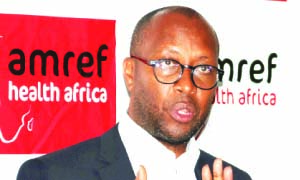By Moses Chimfwembe –
AMREF Health Africa has lauded Zambia for its commitment to improve healthcare services over the past few years.
This is at a time when the continent has been struggling to achieve adequate health financing owing to the COVID-19 pandemic coupled with economic challenges.
To begin with, Africa remains a continent with very low Gross Domestic Product (GDP), a situation that has made the attainment of the Abuja Declaration goal of allocating 15 per cent of the national budgets to health, a far-fetched dream, 20 years on.
Africa bears 25 per cent of the world’s disease burden as per World Health Organisation (WHO) estimates, and to date, none of the countries present in Abuja in 2001, have achieved the declaration’s goal.
With this reality, a Gallup Report suggests that the median cost of healthcare in the sub-Saharan Africa is about US$100 per year per person and according to WHO, only 23 African countries in 2010 were spending $44 of their per capita on healthcare.
Amref Health Africa Group Chief Executive Officer Githinji Gitahi said in an exclusive interview that Zambia has made steady progress in primary healthcare financing.
“About $100 of government money is required per person per year to access quality healthcare. For instance, Zambia’s population is approximately 20 million, so you multiply $100 by 20 million. That’s what Zambia needs to provide some adequate level of primary healthcare. But Zambia is now providing $40, so that is an improvement from the $21 a year before,” Dr Gitahi said.
In the 2023 national Budget, the Zambian Government increased its allocation to the health sector from K13 billion (8.0 per cent) in 2022 to K17 billion (10.4 per cent) in 2023, though short of the 15 per cent Abuja Declaration target.
However, Dr Gitahi said African governments do not have adequate resources to live up to the expectation of the Abuja Declaration that has become a rallying call to mobilise more resources from government coffers to address the pressing health challenges.
“Achieving improved health is costly and African countries have limited fiscal space that has resulted in the health sector to be competing with other priority areas such as education. What this means is that they cannot provide optimal health services to the people,” he said.
As the popular phrase goes, “every cloud has a silver lining,” so are the opportunities to develop advocacy partnerships with social sectors to prioritise food security, water, sanitation and education that impact the population’s well-being and improve human development indicators.
Dr Nkechi Olalere, Executive Director of Strategic Purchasing Africa Resource Centre, in her comment on the Abuja Declaration said, “There have been challenges that we must confront now, the reality is, reaching spending targets is less important than ensuring health systems are adequately resourced and resources are used optimally.”
Dr Gitahi has also called for a shift to use the available resources to the prevention of disease incidence and promotion of well-being to save resources.
“African governments must focus on primary healthcare, prevention, promotion and ensure that we are not consuming a lot of sugar by controlling advertising of sugary products, imposing higher taxes on sugar, controlling consumption of tobacco, alcohol, and reduce pollution,” he said.
Dr Gitahi said, “We must ensure that people are able to lead active lives, generally ensure that we reduce the disease incidence because that’s the only way we can afford because we have prevented the disease incidence.”
He further said Amref, in its eight-year strategy, has adopted a more responsive system to changing needs of public health emergencies especially that the COVID-19 pandemic may not be the last one.
During a meeting with stakeholders in Zambia recently, the Amref Group CEO said his organisation has to be anticipatory of repeated public health emergencies such as ebola and cholera.
“We have repeated outbreaks of ebola and cholera so we have to think about our system and not only the health system but also the things that surround the health systems,” he said.
He explained that, “It’s not just about the health policy but also policy for health by ensuring that people have access to water and sanitation especially that during the COVID-19 pandemic, people who lacked water and sanitation were at higher risk of getting infected with the virus.”
Dr Gitahi said Amref will work to ensure people have access to education and awareness on the best practices to maintain their health, and that, “People have access to food, safe and healthy food so that they don’t become obese but that they are well nourished to actually work and live healthy lives, that is our strategy in the next eight years.”
And Amref Zambia country manager Viviane Sakanga said the organisation is committed to complementing the government in its efforts to attain Universal Health Coverage.
Ms Sakanga said the implementation of the National Health Insurance (NHI) scheme as one area that is benefitting Zambians in accessing primary healthcare.
She has since called on the Zambian Government to bring the informal sector on board so that the benefits of NHI could be extended.
“There a number of factors that are at play in the provision of Universal Health Coverage, one key area is the issue of health financing. We know the Ministry of Health has introduced National Health Insurance which is currently targeting the formal sector.”
“The informal sector is not yet on board, meaning only a specific percentage is contributing and that may not be sufficient, so we need to find ways of bringing the informal sector so that they start contributing. We also need to sensitise those in the informal sector to start seeing the benefit,” she said.







